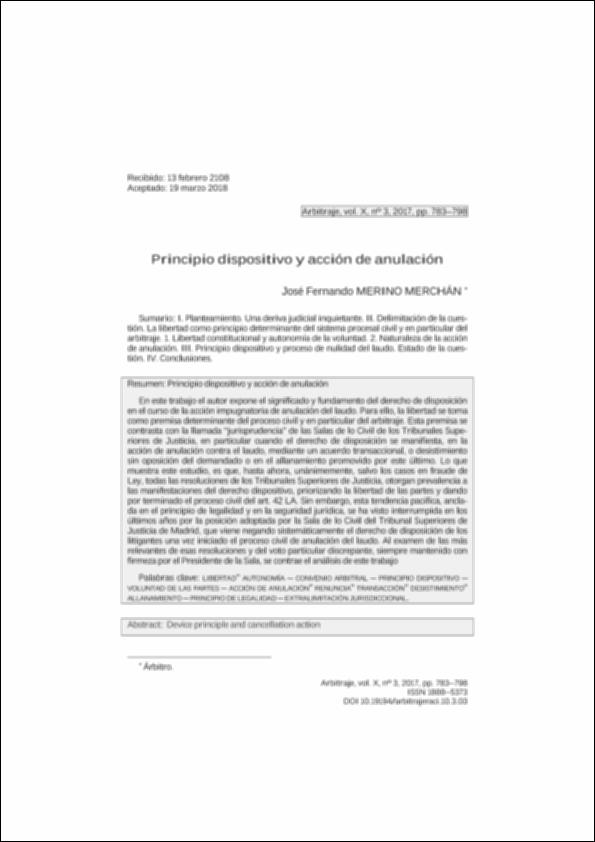Please use this identifier to cite or link to this item:
http://hdl.handle.net/10637/12513Principio dispositivo y acción de anulación.
| Title: | Principio dispositivo y acción de anulación. |
| Authors : | Merino Merchán, José Fernando |
| Keywords: | Autonomía.; Convenio arbitral.; Principio dispositivo.; Voluntad de las partes.; Acción de anulación.; Principio de legalidad.; Extralimitación jurisdiccional.; Freedom.; Autonomy.; Arbitration agreement.; Device principle.; Will of the parties.; Cancellation action "resignation" transaction.; Withdrawal search.; Ing Principle of Legality.; Jurisdictional overshoot. |
| Abstract: | En este trabajo el autor expone el significado y fundamento del derecho de disposición
en el curso de la acción impugnatoria de anulación del laudo. Para ello, la libertad se toma
como premisa determinante del proceso civil y en particular del arbitraje. Esta premisa se
contrasta con la llamada “jurisprudencia” de las Salas de lo Civil de los Tribunales Superiores
de Justicia, en particular cuando el derecho de disposición se manifiesta, en la
acción de anulación contra el laudo, mediante un acuerdo transaccional, o desistimiento
sin oposición del demandado o en el allanamiento promovido por este último. Lo que
muestra este estudio, es que, hasta ahora, unánimemente, salvo los casos en fraude de
Ley, todas las resoluciones de los Tribunales Superiores de Justicia, otorgan prevalencia a
las manifestaciones del derecho dispositivo, priorizando la libertad de las partes y dando
por terminado el proceso civil del art. 42 LA. Sin embargo, esta tendencia pacifica, anclada
en el principio de legalidad y en la seguridad jurídica, se ha visto interrumpida en los
últimos años por la posición adoptada por la Sala de lo Civil del Tribunal Superiores de
Justicia de Madrid, que viene negando sistemáticamente el derecho de disposición de los
litigantes una vez iniciado el proceso civil de anulación del laudo. Al examen de las más
relevantes de esas resoluciones y del voto particular discrepante, siempre mantenido con
firmeza por el Presidente de la Sala, se contrae el análisis de este trabajo. In this work the author exposes the meaning and basis of the right of disposition in the course of the impugnant action of annulment of the award. For this, freedom is taken as the determining premise of the civil process and in particular of arbitration. This premise is contrasted with the current status of the so–called “jurisprudence” of the Civil Chambers of the Superior Courts of Justice, in particular when the right of disposition is manifested, in the annulment action against the award, through a transactional agreement, or withdrawal without opposition from the defendant or in the raid promoted by the latter. What this study shows is that, until now unanimously, except in cases of fraud of law, all the resolutions of the Superior Courts of Justice, grant prevalence to the manifestations of the dispositive law, prioritizing the freedom of the parties and terminating the civil process of article 42 LA. However, this peaceful trend, anchored in the principle of legality and legal security, has been interrupted in recent years by the position adopted by the Civil Chamber of the Superior Court of Justice of Madrid, which systematically denies the right of disposition of the litigants once the civil process of cancellation of the award has begun. Upon examination of the most relevant of those resolutions and of the discrepant private vote, always firmly maintained by the President of the Chamber, the analysis of this work is referred to. |
| Description: | En: Arbitraje: revista de arbitraje comercial y de inversiones. eISSN. 2603-9281. vol. 10, n. 3, 2017, pp 783-798 |
| URI: | http://hdl.handle.net/10637/12513 |
| Rights : | http://creativecommons.org/licenses/by-nc-nd/4.0/deed.es |
| Issue Date: | 19-Mar-2018 |
| Appears in Collections: | 2017 Arbitraje nº 3 |
Items in DSpace are protected by copyright, with all rights reserved, unless otherwise indicated.


